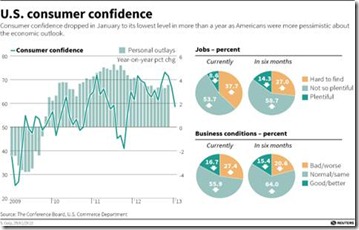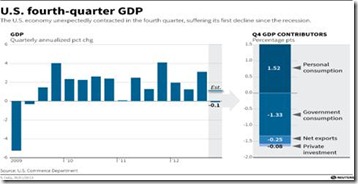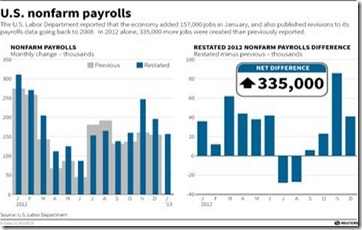Popular Economics Weekly
It shouldn’t be a secret, by now. Consumers are unhappy. And it’s not because we are too busy paying down our debts. It’s really because no one in Washington has been focusing on job creation—at least since 2010, when $830B of ARRA stimulus spending petered out that saved or created some 3 million jobs.
The latest Conference Board survey shows consumer confidence is down a surprising 8.1 points this month to 58.6. This is the lowest level since the debt limit fiasco of 2011. The rise in payroll taxes that was put into effect as part of the fiscal cliff resolution has resulted in lower expectations for future income, which continues the trend of the past 30 years, falling household incomes.
Fewer, down to 13.6 percent, now see their income increasing. While those seeing their income decreasing jumped nearly three percentage points to 22.9 percent which is the highest since 2009. This is also the lowest confidence reading since 2011.
Graph: Reuters
It is happening in part because Republicans turned down Obama’s $4 trillion jobs bill last year that would have boosted growth by some 1 percent. President Obama is also at fault for not pushing job creation measures. Instead, he focused on the Republican agenda of debt reduction, when in fact it is job programs that boost growth, as did the ARRA stimulus spending.
Graph: Reuters
And now we have fourth Quarter GDP growth shrinking for the first time in 3 years. The fourth quarter GDP number is shockingly low. It posted a minus 0.1 percent annualized pace, following a third quarter gain of 3.1 percent. It was the first actual GDP decline since 2009.
This is enough to make everyone unhappy. Much of the slow growth was due to a sharp slowing in inventory investment and a drop in government purchases. Demand figures were not quite as weak as overall GDP but still sluggish. Final sales of domestic product rose 1.1 percent, following an increase of 2.4 percent in the third quarter. Final sales to domestic producers (which exclude net exports) posted a modest 1.3 percent gain after rising 1.9 percent the quarter before.
But some good news is that job growth has been picking up. Payroll jobs in January advanced 157,000, following a gain of 196,000 in December (originally up 155,000) and an increase of 247,000 in November (previously up 161,000). The net revisions for the last quarter is 335,000 additional payroll jobs.
The upward revisions are from annual revisions and indicate that job growth has been somewhat stronger than earlier believed. In 2012, employment growth averaged 181,000 per month. Most of the upward revisions were in the latter part of the year.
Graph: Reuters
But the root cause of the Great Recession was Wall Street banks that had borrowed too much—i.e., became overleveraged thinking housing prices would always go up. It was the failure of Lehman Brothers, Bear Stearns, and AIG that had insured all those bad loans without sufficient capital to back up their ‘bets’ that dried up the credit that was fueling the boom.
Yet consumers continue to be punished for its excesses with more cries to cut government spending and entitlements. As Paul Krugman and others have said; austerity policies are unprogressive, punishing the poor and middle classes, while further enriching the wealthy. And that will continue to depress consumer sentiment, as long as the more extreme elements of the Republican Party have their way.
Harlan Green © 2013
Follow Harlan Green on Twitter: www.twitter.com/HarlanGreen




No comments:
Post a Comment